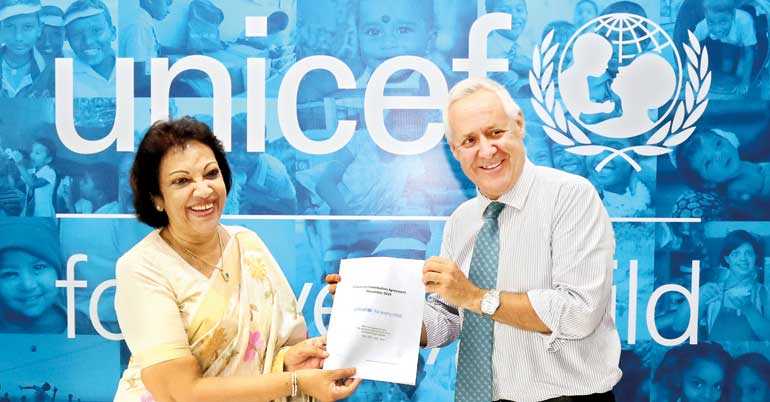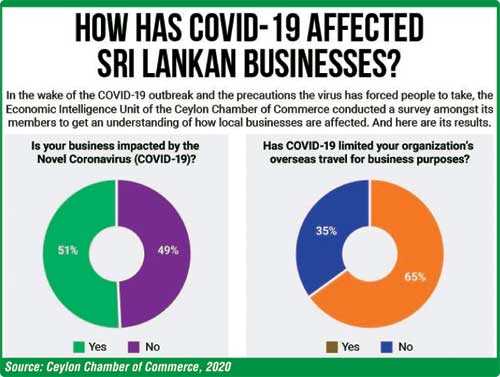Monday Feb 16, 2026
Monday Feb 16, 2026
Wednesday, 26 February 2020 00:01 - - {{hitsCtrl.values.hits}}
- 49% of companies impacted due to Covid-19 virus
- Only 18% say Govt. has addressed cost of living issue
- SL heading for a recession in 2020?

Cause-related marketing: Chairperson Swadeshi Industrial Works partnering UNICEF to drive ‘Honda Purudu’ among children of Sri Lanka
Hermawan Kartajaya is the former President of the World Marketing Association and one of the top 50 marketing gurus who has shaped the world of marketing.
His insight has made many companies change their business strategies and achieve organisational objectives that has made his advocacy a sought-after mantra. I had the opportunity of getting trained by him last week and let me throw more light on his work.
Hermawan Kartajaya credos may be relevant for Sri Lankan marketers given that the Sri Lankan housewife is sinking. Top global research agency for retail insights Nielsen revealed last week that post a household consumption FMCG collapse of six quarters (starting from Q1, 2016 to Q2, 2018), thereafter Sri Lanka saw a brief pick up in the first two quarters of 2018.
But, once again things have taken a southern turn where Sri Lanka’s household are facing another downturn with a -4.2% decline in Q3,2019 on retail off take whilst in the Q4,2019  another -7.4% has declined. This has forced FMCG manufacturers to cut consumer prices to maintain the customer base.
another -7.4% has declined. This has forced FMCG manufacturers to cut consumer prices to maintain the customer base.
Incidentally, the declining household consumption in 2019 led to Sri Lanka registering a 2.6% GDP growth, making the country the lowest performing economy in the South Asian region. This has resulted in severe pressure to marketing companies operating in Sri Lanka.
Year 2020 being a ‘year of elections’ – starting from the General Elections planned for the end of April and thereafter in two months’ time the Provincial Council Elections – further puts pressure on brand marketing companies to maintain business operations.
I guess the research data published by Sunday Times Business where only 18% state that the current Government has addressed the key issue of cost of living means the household woes of last year are continuing in 2020.
What is worrying this year is that already 49% organisations are stating that the Covid-19 coronavirus has impacted business which means that Sri Lanka can be heading to a recession in 2020. The Sri Lankan apparel industry which is linked to the global supply chain of China being affected due to the closure of accessory factories in China means that the overall exports performance of Sri Lanka that registered a marginal 0.4% growth performance will be challenged.
This together with the coronavirus spreading to South Korea can impact the remittances business of Sri Lanka. The lockdown of North of Italy once again due to Covid-19 further can have ramifications to the tourism industry.
Given the above macroeconomic challenges, let me capture the seven key mantras new age marketers must practice.
Hermawan Kartajaya in his book ‘Marketing 3.0’ states that ‘we must learn to love our customers but respect the competitors’. A typical case study in Sri Lanka is the PickMe and Uber businesses. Whilst the business model is novel the fact remains that the focus on the customer is excellent. The logic being that the life of a typical consumer has become very convenient especially on the delivery of food but it has created havoc in the market. For instance a ride from the BIA airport will cost Rs. 1,600 as against the airport taxis charging Rs. 3,000. This has led to a tension between the two entities leading to even fistfights. I guess the Kartajaya mantra of ‘love your customers but respect your competitors’ holds ground.
Whilst accepting that the economy needs an injection to revive consumption, the decision to increase the wages to Rs. 1,000 based on an election promise rather than business logic has made the private sector tea industry go to the wire on financial sustainability.
Just for the record, the wage increase between the time period of 1991-2011 is a staggering 986% whilst there after moving to 830 and now the recommendation to make it 1,000. A point to note is that the Sri Lankan daily wage rate is 137% of the average auction price whilst the other producing nations like India is at 93% whilst Kenya is at a healthy 79%. As per the words of Hermawan Kartajaya, let’s be sensitive to the requested change as many households are finding it hard to survive due the spiralling inflation.
It’s time that the tea industry takes a cue from the apparel sector and focuses on the supply chain correction issues, given that the industry must be commended for the work done on the brand Ceylon Tea, starting from the focused decisions on conforming to global standards on MRL levels and that leading to Ceylon Tea being the first certified ozone friendly tea globally. The new Ceylon Tea campaign that will hit the global media is also feather in the cap for the strong working partnership between the private and public sectors.
One way out is for the tea industry to move to an ‘outgrower model’ or the government must stipulate a ‘productivity-based incentive’. The latter, though promised by the Government, does not turn to reality. In the year of elections, like 2020, the task will be near impossible.
 When Hermawan Kartajaya spoke about guarding your name and being clear in who you are, the one thought that struck me was that whilst category branding is giving leadership to Sri Lanka and the world, be it apparel, Ceylon Tea, Ceylon Sapphire and now Ceylon Cinnamon and Ceylon Pepper, we must be conscious of the overriding Nation Brand Value that has crashed in the last three years. Countries like Algeria and Ukraine have beaten us, taking Sri Lanka down to No. 61.
When Hermawan Kartajaya spoke about guarding your name and being clear in who you are, the one thought that struck me was that whilst category branding is giving leadership to Sri Lanka and the world, be it apparel, Ceylon Tea, Ceylon Sapphire and now Ceylon Cinnamon and Ceylon Pepper, we must be conscious of the overriding Nation Brand Value that has crashed in the last three years. Countries like Algeria and Ukraine have beaten us, taking Sri Lanka down to No. 61.
The Airbus scandal will further take us to the wire which means that we will have to be competing with countries like Nigeria next which is very sad for a country caught up in the cyclical political corruption pattern. As Hermawan Kartajaya advocates, it’s time that Sri Lanka guards its name and builds a clear identity globally.
Whilst it may be good to do business in all segments of the market, a suggestion by Hermawan Kartajaya is that based on a deep dive on a ‘gains and loss’ analysis one must think though and decide which segments a particular brand must target. The logic is that it’s better to focus on a clear need than be everything to everyone – the best example being Lanka Sathosa taking the position ‘Aduma Mila’ in the modern trade business of Sri Lanka.
When Hermawan Kartajaya mentioned this, the thought that crossed my mind was the 150 dollar minimum rate that many are requesting for the city hotels in the tourism business. The question one must ask is, why do we need to regulate a market like what was done in the 1960s?
In today’s world the best option is to allow the supply-demand equilibrium dictate the price. As per what Hermawan Kartajaya says, ‘always offer a good package for a fair price’.
It’s sad but in Sri Lanka negative new gets attraction and eyeballs to the media. But as Hermawan Kartajaya said, we must spread good news and be available for comment to the world if we are to progress in the world of business and marketing.
Given this insight I guess it’s time that Sri Lanka thinks of inducing a brand board and thereby generates positive news within the country and globally. We saw how the Chinese Government practiced this using doctors and patients and their families whilst battling the coronavirus outbreak.
I really like this thought of Hermawan Kartajaya that whatever business one is in, it is a service business. Rather than crying out the issues that a typical company is up against when wanting public sector services (let’s say to renew a vehicle license at the RMV) a better option would be to do a touch point study so that we can understand the ‘as is’ situation and address the issue and then recommend a solution like what the passport office has implemented so well.
Let’s accept it, when an economy has been grown from $ 30 billion to $90 billion within a 10-year time period, we cannot expect the administration system to run at 100% efficiency when the salary and motivation factors are the same. This means reforms have to come in and it will be painful. The private must support this agenda. However, this will have to wait till end April the earliest I guess.
Whilst the above seven ideas may sound very basic, it has worked around the world to shift organisations and countries to become competitive. Let’s start taking one idea at a time and developing our business.
(The writer can be contacted via [email protected]. The thoughts expressed are his own and not the views of any organisation he serves in Sri Lanka or internationally.)